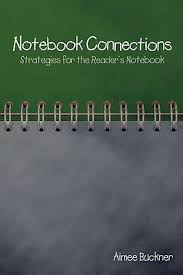Good morning! I recently finished reading Notebook Connections by Aimee Buckner. What a good read! Last year was my first experience teaching reading through readers' workshop. We had a full day training, and then pretty much hit the ground running. Most of our follow up support was focused on making sure that everyone had a good understanding of the flow of a focus lesson, from the modeled practice, to the guided practice and gradual release into independent practice. I felt comfortable enough in teaching my focus lessons, and got to the point where I was comfortable picking and choosing lessons from different sources/materials. I really used Fountas & Pinells' Guiding Readers and Writers. I loved their version of the reader's notebooks. I went out and purchased a class set of binders, dividers, you name it, I got it. I put my notebooks together and was all set to implement them in the classroom. In theory it was a good idea, but when it came to really using them I found myself lacking. I couldn't put my finger on what it was about them that wasn't working for me, I just knew I wasn't getting what I'd hoped for from them. When students were writing responses to me I really felt like they were just retelling the story. Many even just wrote exactly what happened in the story word for word, even though I'd modeled writing a thoughtful response many times. I couldn't figure out where I went wrong with them, so I abandoned them. After having read Notebook Connections, I'm now so much more confident in using readers' notebooks in my classroom. I was able to figure out what wasn't working for me. I wasn't getting carry over of the strategies I was teaching in class, and I struggled to have their responses be meaningful and taking their thinking deeper. What I love most about Notebook Connections is that Aimee includes not only descriptions of the strategies she teaches her students, but also student samples, and snippets of actual classroom dialogue. For me this was a huge turning point. I am a very explicit learner, I need to read it, hear it, and see it to get it, and this book did just that. Among some of my favorite strategies that Aimee introduces to students are:
*Finding a Spark: We use so many sticky notes in readers' workshop, and then what do we do with them? I've given students places in their notebooks to place them, sort of a sticky note parking lot. But I felt that's all they were, parked, abandoned, and what then's the point? Aimee's Finding a Spark strategy teaches students to go back to their thoughts tracked on sticky notes and to look at their thinking. Students are looking for thinking that went deeper, or created a "spark" of thinking so to speak. I absolutely LOVE this idea. It was exactly what I was looking for. I now have another tool to push my students' thinking deeper. Who doesn't love that?
*Leaning In: This strategy is all about enhancing students' inferences by "leaning in" to the story more to look more closely and see those details that the author may have not come right out and told us about, and to make more meaning of what's read. What I love about this strategy is that it presents different layers to the visualization strategy that we all use. Using these different layers students will also have another way to communicate whether they are reading just right level books based on the types of images they are seeing. This will be extremely valuable for me. If I have a student telling me that they are only seeing "still pictures" like photographs I can infer that they are struggling to really comprehend the text that they are reading, and I can use this information in my conferences with students to help better direct them to just right level books.

I can't say enough about this book, I finally feel like I will be able to help my students make meaningful connections between what they are reading, the thinking that they are tracking, and their readers' notebooks. I finally feel like our thinking there will not just be "parked", it will be referred to, and revisited to continue helping students make more meaning of what they've read.
~Heather~
P.S. I just realized that I've hit 30 followers! That's amazing! I know that some people have hundreds and thousands, but I'm honored that all of you tune in to read my thoughts and ideas. Stay tuned for a freebie coming soon just for all of you as a thank you! =)
I agree! The same thing happened to me. I unfortunately did not have a great book to help me and I had to slowly (through many failed attempts) try to figure it out. It's hard to teach yourself while teaching your kids, you know? Thanks for the tip- I'll grab the book! :)
ReplyDeleteAlways A Lesson
Absolutely, I completely feel like if I had had the time before having to start workshop to read this book that this past year could have been so much better. At least now I know I'll be starting off much stronger, and it can only get better! =) Thanks for stopping by!
ReplyDelete